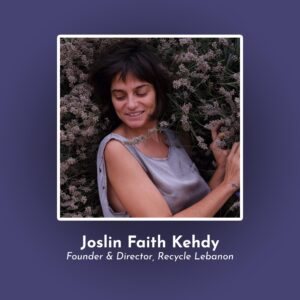
Show Summary
On this episode, Nate is joined by Joslin Faith Kehdy, a changemaker and citizen of Lebanon. Over the last 3 years, Lebanon has had a 50% drop in GDP and 98% devaluation in their currency, massive unemployment, and – among many other things – an ongoing waste crisis. Throughout this, Joslin has been a leader in responding to and coming up with new (and old) ways for living a dignified and simplified life. Joslin is an environmentalist currently living ‘The Great Simplification’ – she offers a valuable perspective on what ‘sustainable’ living really means and insights for what may come to the rest of the world.
About Joslin Faith Kehdy
Joslin Faith Kehdy is the Founder and Director of Recycle Lebanon, whose goal is to make a circular system change to “re-psyc’le” our mindset towards action. Since 2015, Recycle Lebanon has been organizing projects focusing on reducing plastic usage and pollution in Lebanon, while building initiatives to expand nature based consumption & production alternatives. A hands-on unlearner with a devotion for land & water stewardship, Joslin lives off-grid, homesteading in the rural village of Baskinta, Lebanon.
Joslin’s organization, Recycle Lebanon, is fundraising for their newest initiative: TerraPods. If you’d like to learn more or support this project please visit: Sustain Lebanon – TerraPods
In French, we have a motto that says that a simple drawing is often better than a long explanation. Jean-Marc Jancovici Carbone 4 President
That’s very understandable because with left atmosphere thinking, one of the problems is that you see everything as a series of problems that must have solutions. Iain McGilchrist Neuroscientist and Philosopher
We can’t have hundreds and hundreds of real relationships that are healthy because that requires time and effort and full attention and awareness of being in real relationship and conversation with the other human. Nate Hagens Director of ISEOF
This is the crux of the whole problem. Individual parts of nature are more valuable than the biocomplexity of nature. Thomas Crowther Founder Restor
Show Notes & Links to Learn More
Download transcript00:35 – Joslin Faith Kehdy + Recycle Lebanon TerrPods Fundraiser
00:46 – Economic crisis in Lebanon
01:12 – Recycle Lebanon
06:05 – Fast Fashion Industry
07:30 – 50% GDP drop, 82% poverty rate, and the value of the currency has lost 90%
09:10 – Corruption in Lebanon
12:03 – Rolling blackouts in Lebanon
12:09 – $1.5 million electric budget and 40% of debt
12:57 – Texas booming oil and gas industry
16:59 – Bank account closures in Lebanon, Account holders robbing the banks
19:57 – Lebanese revolution in 2019
22:53 – Beirut Port Blast
23:54 – Lebanon medical care shortage and deliberate medicine inflation
26:01 – Lebanese food imports
26:25 – IMF and World Bank
26:40 – NGOs in Lebanon
29:17 – Lebanese Fuel Outages
32:15 – Circular Economy
33:20 – Regenerate Hub Circular Economy Database
34:35 – Waste management crisis in Lebanon
36:59 – EcoSouk
37:35 – Zero Waste Shops
44:50 – Dive Into Action
47:20 – TerraPods
47:49 – Plastic Alternatives Guide
48:50 – Makerspaces
51:22 – STEAM
1:00:15 – Microplastic release from fabrics made of plastics when washed
1:01:01 – Fiber Farms
If you’d like to contact Joslin or Recycle Lebanon
Kehdy@recyclelebanon.org or Connect@recyclelebanon.org







